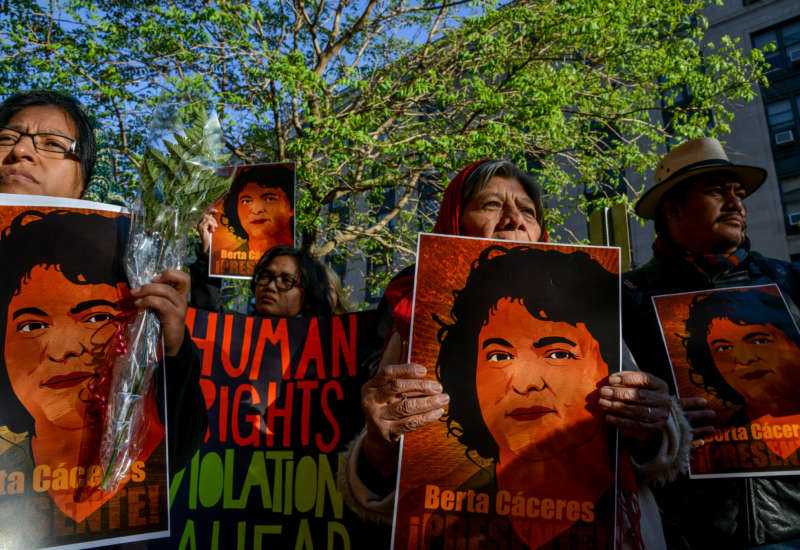Catastrophic climate change is heating the planet, shattering records from Siberia to California, fueling wildfires, droughts and hurricanes. Yet, land and water defenders fighting to save the planet face threats ranging from intimidation to imprisonment to assassination.
In Honduras, Berta Cáceres was a leader of the indigenous Lenca people’s campaign to stop construction of a hydroelectric dam on the Gualcarque River, which they consider sacred. She was gunned down in her home on March 2nd, 2016. Seven men who carried out the execution were convicted, but the person who ordered the killing escaped justice — until this week. On Monday, the Honduran Supreme Court, in a unanimous decision, found Roberto David Castillo guilty of ordering the murder of Berta Cáceres. Castillo was the head of Desarrollos Energeticos or DESA, the company that was trying to build the dam. He was a 2004 graduate of the U.S. Military Academy at West Point, and a Honduran military intelligence officer. His conviction won’t bring Berta Cáceres back, but it might deter similar attacks and ultimately save lives.
Honduras has long been a virtual colony of the United States, providing bananas, coffee, and minerals for export, produced with cheap labor that has created one of the greatest gaps between rich and poor anywhere in the world. Honduras has also been a base of operations for the U.S. military and CIA, from the 1954 overthrow of the democratically elected president of Guatemala to the Contra forces in the 1980s when the U.S. attempted to overthrow Nicaragua’s Sandinista government.
After he was elected in 2006, former Honduran President Manuel Zelaya, despite being a member of the elite, promoted populist, progressive policies, like an increase in the minimum wage. On June 28, 2009, Zelaya was ousted in a coup d’état. Since then, corrupt, U.S.-backed rightwing presidents have ruled Honduras, prioritizing privatization of public resources and multinational corporate profiteering. Mass unemployment and increasingly violent criminal gangs have added to the already dire conditions there, driving tens of thousands to seek the safety of asylum in the United States.
A vigorous grassroots resistance movement has grown in Honduras, led by workers and indigenous communities. Berta Cáceres co-founded COPINH, the Civic Council of Popular and Indigenous Organisation of Honduras, in 1993. In 2006, she began organizing against the Agua Zarca hydroelectric project, successfully driving out DESA’s key partner, Sinohydro, the world’s largest dam builder. Cáceres was honored for her leadership in 2015 with the prestigious Goldman Environmental Prize. Less than a year later, she was dead. In the wake of her murder, DESA’s international funding partners backed out of the project, and the dam remains unbuilt.
“Berta Cáceres was someone who called out Hillary Clinton and the Obama administration constantly,” Pitzer College professor Suyapa Portillo, said on the Democracy Now! news hour. “She used to say Honduras is a laboratory for what the U.S. wants to do in other countries, not just in Latin America.” Then-Secretary of State Hillary Clinton defended the overthrow of Zelaya without publicly calling it a coup. In 2012, Vice President Joe Biden met with the first coup president, Porfirio Lobo, reaffirming the “long and close partnership” between the two countries. Biden was supported on that trip by his advisor Tony Blinken, who is now Secretary of State.
Honduras’ current president, Juan Orlando Hernández, has been implicated in the cocaine trafficking for which his brother Tony Hernández is currently serving a life sentence in prison.
“The role of the U.S. in Honduras and the reason we’re critical of it is because it has been a role of extractivism, of racial capitalism,” Suyapa Portillo added. “A role that has never been about respecting the sovereignty of Honduras or other Central American nations…We’re seeing more of the same.”
The environmental/human rights group Global Witness, in its most recent annual report on attacks against land and water defenders, found at least 212 of these front line activists were killed in 2019, and that, as the climate crisis intensifies, so do attacks on defenders. Honduras was fifth on the list, with the highest per capita rate for murder of environmental activists in the world.
In her 2015 Goldman Prize acceptance speech, Berta Cáceres said,
“In our worldviews, we are beings who come from the Earth, from the water and from corn. The Lenca people are ancestral guardians of the rivers, in turn protected by the spirits of young girls, who teach us that giving our lives in various ways for the protection of the rivers is giving our lives for the well-being of humanity and of this planet.”
The cost of preserving life should not be death. As the climate emergency intensifies, we all have a responsibility to protect front line defenders like Berta Cáceres.


